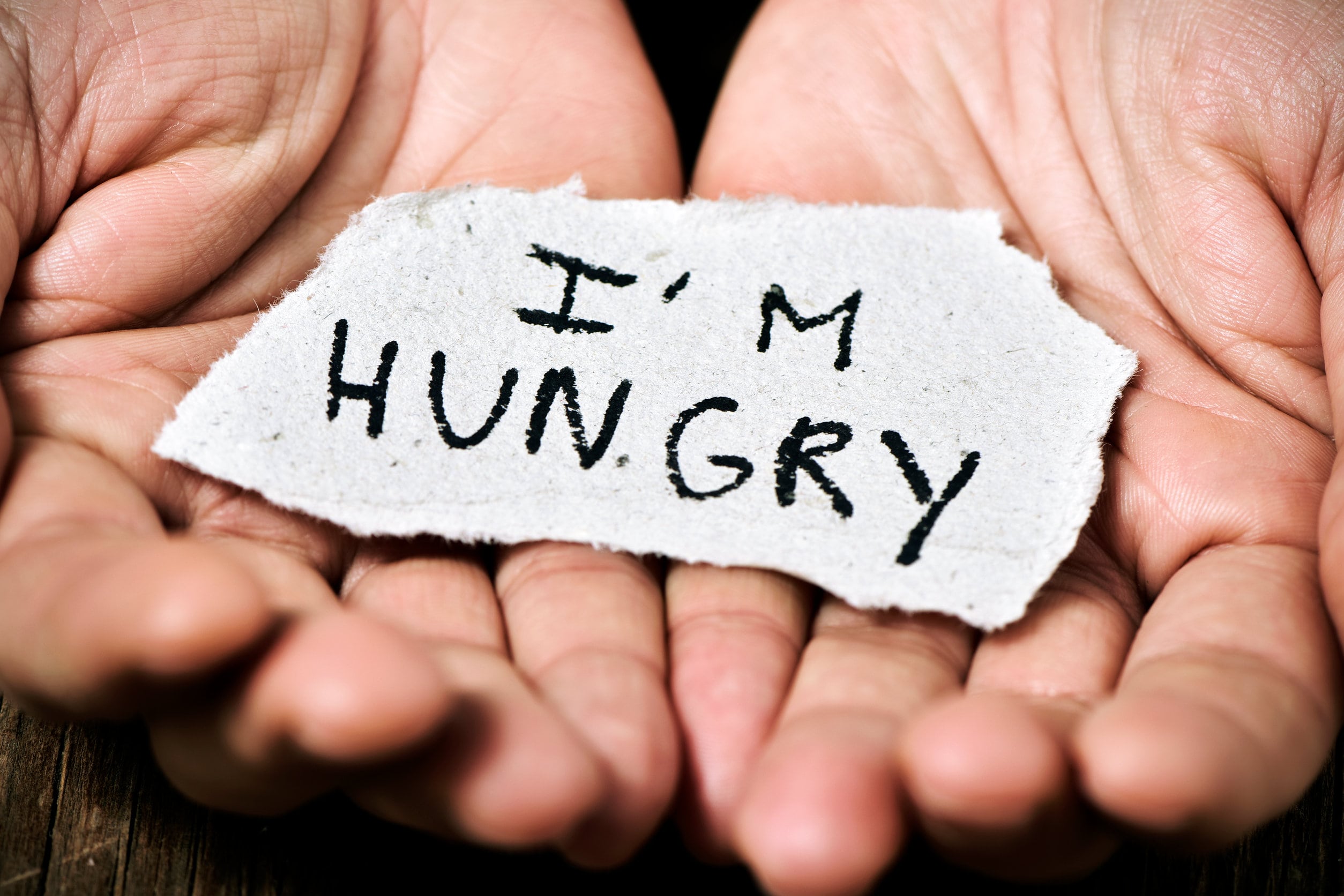What is hunger?
Hunger is a physiological process – in other words, the physical body is signalling that food needs to be consumed to maintain energy levels. Different chemical substances and signals produced by both the brain and the gut, are involved in helping to manage this process effectively.
Hunger is complex
The process of hunger involves the mind and the body! The body and mind communicate with one another through the production and release of different substances in the body depending upon nutrient and energy availability. For example, a substance called ghrelin is released in the stomach when the stomach is empty. Another substance, leptin is released to signal that you are full. Its levels are also associated with body fat levels. Hunger is complex because the signals that are involved in hunger also interact with the signals that are involved in appetite. Additionally, there are multiple other substances/signals that can influence the hunger process – levels of stress, sleep, what you ate in your earlier meal and exercise that you’ve done!
The difference between hunger, appetite, cravings
Appetite can be thought of as a desire to eat, whereas hunger is more of a need to eat. A good way of distinguishing hunger from appetite is by considering your food choice. When you are truly hungry, you tend to not be too fussed about what you eat and are happy to eat whatever. Appetite on the other hand can be understood more as “I quite fancy”….
Appetite can be influenced by many different factors – from how you’re feeling to what’s going on around you at work or at home. Many people’s appetite is influenced by levels of stress, their mood, and boredom! Appetite behaviours can also be learned and your signals for hunger can be synchronised depending upon when you eat.
Cravings can be defined as a stronger desire than appetite to eat a certain food. You may feel like you need to have a certain food. Although some people believe that a craving is a sign that you need certain nutrients, there is not much research to support this. Cravings can occur for a variety of reasons – being unaware that you have seen a certain food (marketing), stress/emotions, low energy availability and tiredness.
Understanding hunger types is important for weight loss
By better understanding hunger/appetite/cravings, you are empowered to make better informed decisions about how you respond to these feelings and thoughts and create habits that serve you and enable you to meet your weight loss goals.
Types of hunger
The term “hunger” is actually incorrect and may refer more to “appetite” or a sensation/feeling that we confuse with hunger! However, the word hunger is popularly used, so we’ll stick with it. Here are a few of the most common ones.
1. Eye hunger
Ever wondered why you can spend so long looking at those recipe blogs? Because it looks aesthetically pleasing and appeals to your taste buds (and stomach).
Fix: choose to look at blogs on the outdoors, fitness or other interesting activities that take your fancy when embarking on a weight loss diet.
2. Nose hunger
The smell of food can get those taste buds going! The smell of food can also work to reduce hunger if you smell it enough.
Fix: if you fancy a specific food because you smell it, rather than have it at that time, you can plan to have it as part of your planned nutrition plan either that day or in the week – that way you know you’re having it because you truly want it rather than on the spur of the moment.
3. Mouth hunger
This one can be understood as those times when you may want to be chewing something. You may even want the taste of something salty or sweet. Much more like a craving and likely to be related to stress and boredom hunger!
Fix: have a drink of water/cup of herbal tea and plan to incorporate an appropriate portion of what you fancy as part of your personalised nutrition plan.
4. Stomach hunger
This type of hunger might be thought of as being closer to true hunger – think stomach growling. However, sometimes your stomach can growl due to other reasons and past foods that you’ve consumed.
Fix: be consistent with the types and regularity of when you consume foods so that you become better equipped to recognise these different types of sensations.
5. Cellular hunger
This is a tricky one to define but it’s thought of as a signal for nutrients that you may be requiring. A common association that is spoken about is often a chocolate craving around menstruation being a sign of a higher magnesium need, although we are unconvinced on this particular association!
Fix: include 1-2 non starchy veg at every meal and rotate your protein and veg sources to consume a variety of nutrients. Consider supplemental support and/or get some lab tests done that help assess nutrient requirements.
6. Boredom hunger
Boredom is a significant trigger for hunger. A lack of consistency in your diet and tasks, or a sense of unfulfillment in what you are doing can leave you feeling bored and in need for distraction or a pick me up.
Fix: focus your mind on something and start a task. If you are genuinely hungry then in 5-10 minutes your hunger will be persisting, and you will have to stop the task to eat. Make sure the task you pick is engaging and something that fulfils you!
7. Stress hunger
Hunger and appetite signals can be influenced by levels of the stress hormone cortisol. If you’re having a stressful time at work or have family drama going on, it might be that your hunger and appetite are all over the place. For some people this can mean wanting to eat more, for others less.
Fix: sticking to a regular meal schedule and pre-planning your food choices can be especially helpful during a time of stress. Ensure you have a plan so that you can override the more impulsive mindset that occurs as a result of being more stressed.
8. Emotional hunger
Wanting to eat certain foods or eat in general can be a learned response to managing emotions. There is also a strong connection between the foods that we eat and different emotions from our upbringing. Ever wondered why that certain apple crumble your mum makes is so irresistible? Likely that you were given it growing up and it has some strong emotional connections attached to it. Perhaps you have a particular meal you crave when you are celebrating or when you are sick. These are often emotional hungers driven by specific triggers.
Fix: start to become aware why you like certain foods so much – there is usually a deeper meaning behind it rather than just “liking” it. We often advise on keeping a food, symptoms and emotions diary to help track our thoughts around food choices. This helps to gain a deeper understanding about our relationship to food.
9. Habit hunger
Do you find that you always have an appetite for a biscuit at 4pm or a dessert after your evening meal? May well be that it’s simply a habit. It’s also likely that your habit hunger is a mixture of other types of hunger – emotional and stress for example. Additionally, it might well be due to some cellular hunger if your meals aren’t well balanced and providing you with adequate nutrients and energy.
Fix: try replacing the habit with a different habit, such as a 5 min breath of fresh air, taking a walk, brushing your teeth, taking a shower etc. We are naturally creatures of habit, so often it is about simply establishing new habits. This involves planning and then commitment to make those habit changes.
Key takeaways
Hunger and appetite are different: hunger is a physiological process that communicates the need to consume food to maintain energy levels and appetite is a desire to eat food. They both interact with one another and managing them effectively is important for successful weight loss.
Hunger and appetite are affected by many different factors: from what you eat, to stress, to mood, to what’s going in the environment around you. Start to become mindful of how you feel in these different situations in relation to food.
Understanding your hunger and appetite is important for weight loss: and can be better done by following your own unique nutrition plan and reflecting upon how you experience hunger and appetite. Understanding your hunger and appetite is a process and plays an important role in being able to adhere to your weight loss diet in the long term, as well as maintaining weight loss success.
Work with a weight loss specialist
Our clinicians specialise in weight loss. All our qualified nutrition professionals have backgrounds in the exercise industries and a vast amount of experience coaching clients towards their goals.
Check out our weight loss specialist page, where you can learn more about our services, clinicians and the support and programs that we offer.
If you would like to enquire to work with one of our practitioners, please click the button below:
















